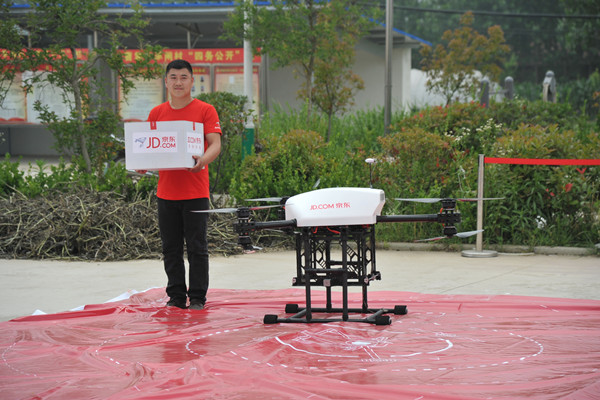JD.com unveils 'smart logistics' strategy to further deploy autonomous delivery service
By Liu Zheng (chinadaily.com.cn) Updated: 2016-10-17 17:22
 |
|
JD.com for the first time used its self-developed drones to deliver online purchases made by villagers in Suqian city of East China's Jiangsu province. JD staffer Liu Genxi, pictured, sends the packages to village shoppers after collecting the delivery from a drone. [Photo provided to chinadaily.com.cn] |
Autonomous robots are once again top priority for the Chinese e-commerce industry.
Xiao Jun, head of JD's X Lab, a business unit dedicated to adopting cutting edge technology in logistics and delivery, told China Daily that the company will soon launch a couple of new hybrid power-driven drones to further implement the company's "smart logistics" strategy.
"The existing 3-axis and 6 rotor drones that [are] being tested in Suqian, Jiangsu province, have helped the company to collect flying data so as to enhance the performance of the upcoming new devices."
"We've made certain progresses for improving the drones in two perspectives – flying distance and maximum capabilities," said Xiao. "We've been testing gas-powered drones and hybrid drones in some scenarios to replace the existing battery-driven devices as the latter heavily rely on battery lives and reserve obvious limitations due to the current performance of batteries."
He noted that the drone delivery service will specialize in rural areas of the nation where normal ground transportation is not as efficient.
Shi Xianliang, vice president of China Society of Logistics and associate dean of the School of Economics and Management of Beijing Jiaotong University, said by following the technologies gradually as they mature and costs reduce, internet companies such as JD and Alibaba have secured the ability to deploy to autonomous regions for commercial usage.
However, he said that one of the core issues needing to be solved is the traffic regulations and laws that are associated with drones or autonomous vehicles. He believes that the technologies' development and improvement will appear ahead of the rule-making progress.
JD.com recently joined hands with the university to kick off a robot R&D challenge, aiming to encourage college students to participate in the company's autonomous services development, including warehouse management, drones and self-driving automotive deliveries.
The challenge will eventually be introduced to other universities in Shanghai, Hangzhou, Chengdu, Harbin, Xi'an and Wuhan.
- JD.com joins hands with China United Property Insurance
- JD.com builds up high-end image
- JD.com going into VR battle with Alibaba
- JD.com customers go for high-end quality
- DJI takes on US drone giant with latest airborne offering
- GoPro's Karma drone to arrive in China to stir the market
- First annual Drone Festival in Paris
- World's thinnest drone launched in China
- JD.com unveils 'smart logistics' strategy to further deploy autonomous delivery service
- Competition to promote innovation and creativity
- Poverty relief at heart of new industry fund
- China's new-generation training ship delivered
- BRICS to continue growing momentum, contributions to world
- Implementation of guidelines key to debt-to-equity swaps programs' success: IMF senior official
- Six-pack abs turn construction worker into online celebrity
- Rusty cars to sustain rally for top metal


















